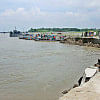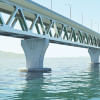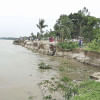An upazila all but gone

Teacher Habibur Rahman is proud to be registered as a voter in his ancestral village, Bridashuria in Chowhali upazila of Sirajganj. But in reality, his village no longer exists. Most of the upazila no longer exists. Over the last three decades the Jamuna has claimed as much as 85 percent of Chowhali. A land area of 210 square kilometres has been reduced to a little over 30. Nationwide, Chowhali is likely the upazila worst-affected by river erosion.
“In the 1980s we had a large residential house set on four bighas of land,” Habibur recalls. “We had a hundred bighas of farmland. The monstrous Jamuna ate up everything. Nothing exists now.”
Habibur still teaches at Chowhali Girls' College but resides in adjacent Nagarpur upazila of Tangail. His once-united family is scattered; yet his situation could be worse.
To meet Abdus Salam from Ghasdholai village is to see a run-of-the-mill day labourer. But he hails from a wealthy landowning family. “We had a 600-bigha property,” he says. “We had a generous inheritance to look forward to. It's in the river now. I work as a hired hand in Shahzani village in Nagarpur and I live on a donated patch of ground in a slum.”
Tales of woe are common in Chowhali. Some families have moved their houses up to 10 times during the last 30 years, in a futile attempt to circumvent the river's wrath.
“Chowhali is extremely vulnerable,” says its upazila nirbahi officer Md Anisur Rahman. “In 2013, our upazila council chambers, the health complex and a public warehouse were washed away. Since then the upazila is being administered from temporary offices in educational institutions and previously abandoned buildings.”
“I have requested a fresh survey of the whole upazila from the land ministry, to properly assess the massive changes that river erosion has caused,” he adds.
Although it is said that the Dutch made Holland, the hard truth is that nowhere in the world has a river as large as the Jamuna been entirely tamed. Nevertheless, erosion reduction initiatives can assist, and in the case of Chowhali mistakes have been made.
“When the Bangabandhu Bridge was constructed, the river's course on the western bank was altered,” explains Abdul Matin, a professor of the civil engineering department at the Bangladesh University of Engineering and Technology. “The water had to go somewhere. As the river flows through plains at that point, it simply widened.”
In 2014, a remedial project now valued at Tk 124 crore was initiated, to build a seven-kilometre protected embankment in Nagarpur and Chowhali. But this year alone, newly-constructed parts of the embankment were themselves eroded many times.
“The stretch at Chowhali Point was eroded up to 20 times in the past 12 months,” says Md Sajahan Siraj, the executive engineer for the Bangladesh Water Development Board in Tangail. “At Khaskaunia Point, erosion damage has occurred around 10 times.”
Matin believes the embankment's fault is in its design. “The calculations of the weight carrying capacity of the soil were not done properly,” he says. “The structure of the soil is especially fragile in parts of Chowhali upazila. Without special arrangements being incorporated into the plan to accommodate this factor, further erosion is inevitable.”
Alongside such planning failures, unregulated sand extraction from the river also exacerbates the erosion threat.
In the meantime, and as far as it can, daily life in Chowhali continues, with significant additional hardship caused by the area's shifting geography.
“I went to the makeshift health complex with a minor injury to my leg last week,” says Abdul Halim, a resident of Khaskulia village. “But I was referred to the district town which is 80 kilometres away!”
“We don't have adequate facilities anymore to ensure good service,” admits Md Ashraful Islam, the dental surgeon in charge of the complex's emergency unit.
Meanwhile, at the land registration office which is currently located in an abandoned building of Khaskaulia Pilot Model School, deed writers work on the floor.
“Government services in Chowhali are poor,” lawmaker Abdul Mazid Mondol told The Daily Star. “There is a lack of facilities at the moment. New government establishments will be constructed soon. We have already acquired six acres at Kodalia for such purpose.”

 For all latest news, follow The Daily Star's Google News channel.
For all latest news, follow The Daily Star's Google News channel. 







Comments